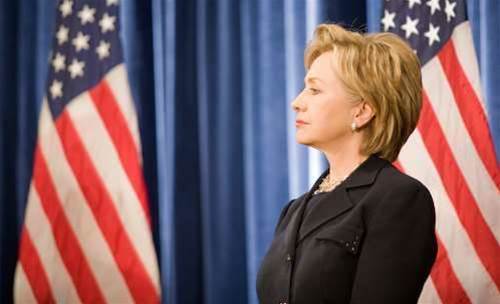The FBI has recommended that no criminal charges be filed over Hillary Clinton's use of private email servers while she was secretary of state, but it sharply rebuked the Democratic US presidential candidate for "extremely careless" handling of classified information.

While FBI director James Comey's announcement lifted a cloud of uncertainty that had loomed over Clinton's White House campaign, his strong criticism of her judgement is likely to fuel a continued onslaught on the email issue by her Republican presidential rival, Donald Trump.
In a lengthy statement on the FBI's conclusions from its year-long investigation, Comey directly contradicted statements Clinton has made while defending her use of the private email setup.
He said, for example, that the FBI found at least 110 emails that contained classified information when they were sent, although Clinton has repeatedly said she never sent or received classified information on her private servers.
"Although we did not find clear evidence that secretary Clinton or her colleagues intended to violate laws governing the handling of the classified information, there is evidence that they were extremely careless in their handling of very sensitive, highly classified information," Comey said.
But he said the FBI concluded "no reasonable prosecutor" would bring charges.
"Although the Department of Justice makes final decisions on matters like this, we are expressing to Justice our view that no charges are appropriate in this case," Comey said.
His recommendation will likely stand. The country's top prosecutor, US attorney general Loretta Lynch, said on Friday that she would accept the recommendations of career prosecutors and the FBI director on whether to charge Clinton for mishandling emails.
Clinton's campaign was anxious to move on after Comey's announcement, saying in a statement it was pleased with the FBI decision.
"As the secretary has long said, it was a mistake to use her personal email, and she would not do it again. We are glad that this matter is now resolved," spokesman Brian Fallon said.
He did not respond to questions about Comey's rebuttal of the main arguments Clinton has offered in defense of her use of private email.
Trump, who has said the controversy should disqualify her from being president, said Clinton "lied" when she said she did not send classified information on her private email.
"But because of our rigged system that holds the American people to one standard and people like Hillary Clinton to another, it does not look like she will be facing the criminal charges that she deserves," Trump said in a statement.
The findings
The FBI had been investigating whether Clinton broke the law as result of personal email servers kept in her Chappaqua, New York, home while she was secretary of state from 2009 to 2013. One question was whether she mishandled classified information on the servers.
As the investigation wound up, Clinton underwent a voluntary three-and-a-half hour interview with the FBI on Saturday in Washington.
Comey said the FBI did not find that Clinton or her colleagues intended to violate the law, and that there was no "intentional misconduct" by her lawyers who sorted her emails.
He said her staff should have known Clinton's private email was an improper place for classified information, but said there was no evidence that anyone had hacked Clinton's communications.
Comey said, however, that "hostile actors" gained access to email accounts of people who Clinton corresponded with regularly. He also said she used email extensively while traveling "in territory of sophisticated adversaries."
Experts routinely advise US government officials to not bring important digital information to countries with a track record of aggressive cyber activity. Clinton traveled to more than 100 countries during her four years as top US diplomat, including trips to both China and Russia, considered among the most sophisticated US cyber adversaries.
The FBI found 110 emails in 52 email chains that contained information that was classified at the time the messages were sent, Comey said. Eight of those chains contained "top-secret" information, the highest level of government classification for material that could harm national security.
Another 36 email chains contained "secret" information, and eight "confidential" information, he said. Agents also found three classified emails among the thousands Clinton never returned to the State Department.
Comey said there were no previous cases that supported filing criminal charges against Clinton. Other cases had involved intentional mishandling of information, he said, and there was no evidence Clinton knew she was violating the law.
Last year, the FBI recommended that former CIA director David Petraeus be charged with a felony for his mishandling of classified information with his biographer, with whom he was having an affair.
In that case, however, the FBI had evidence that Petraeus knew the information was highly classified. Petraeus eventually pleaded guilty to a misdemeanor charge of mishandling classified information.
Republican lawmakers have called for an independent investigation of Clinton, saying they do not trust the Justice Department to handle the inquiry with impartiality.
House of Representatives speaker Paul Ryan, the highest ranking elected Republican, said Comey's announcement "defies explanation."
"Declining to prosecute secretary Clinton for recklessly mishandling and transmitting national security information will set a terrible precedent," Ryan said.


_(20).jpg&h=140&w=231&c=1&s=0)
_(33).jpg&h=140&w=231&c=1&s=0)
_(23).jpg&h=140&w=231&c=1&s=0)






 iTnews Benchmark Awards 2026
iTnews Benchmark Awards 2026
 iTnews Executive Retreat - Security Leaders Edition
iTnews Executive Retreat - Security Leaders Edition
 iTnews Cloud Covered Breakfast Summit
iTnews Cloud Covered Breakfast Summit
 The 2026 iAwards
The 2026 iAwards












_(1).jpg&h=140&w=231&c=1&s=0)



